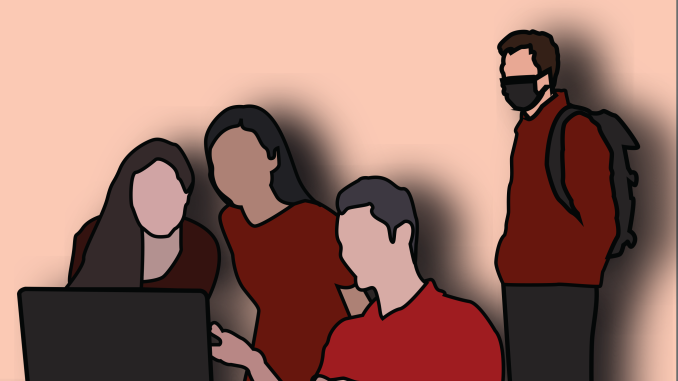
After two years of required masking on campus, Temple University may be returning to “normal.” Masks are no longer required in non-healthcare spaces, asymptomatic testing will be phased out and students and employees with vaccine exemptions won’t be tested regularly.
However, as monkeypox begins to spread in Philadelphia, students have yet another public health concern on top of the continued risk of COVID-19.
Students must be mindful of other peers’ and employees’ concerns about both viruses by closely monitoring and protecting their own health and masking if someone asks them to. Having conversations about people’s health-related concerns and continuing to take steps to reduce the risk of infection in classrooms and other shared spaces can help create a safe and healthy environment for those who feel uncomfortable returning to campus amid the new guidelines.
“Communication is important for anything, and it’s just as important with your health,” said Emma Esterbrook, a senior public health major. “The more we talk about it, the more normalized the conversations become and the more likely people are to respect your own health decisions.”
Although the university’s COVID-19 guidance has been approved by Temple’s Public Health Advisory Council and aligns with Philadelphia’s masking policy, the Temple Association of University Professionals, a union composed of all Temple faculty, professional librarians and academic professionals, doesn’t believe Temple made the right call.
“Not having any option to mandate masks indoors is a mistake,” said Danielle Scherer, assistant professor of political science and global studies and TAUP’s vice president of operations. “It’s particularly irresponsible to ignore the science and create a potential cluster of cases on campus, especially in the first couple of weeks as people return from relatively far away.”
As the spread of monkeypox is a relatively new concern and different from COVID-19, Temple is monitoring the situation and not currently taking further steps to mitigate the virus, said Mark Denys, senior director of health services.
Pennsylvania has nearly 500 confirmed cases of viral infection, with at least 257 cases in Philadelphia as of Aug. 22. Pennsylvania State University confirmed its first monkeypox case at its main campus on Aug. 13, becoming the third Pennsylvania university to confirm a case after West Chester and Bucknell initially reported cases.
An estimated 6.2 percent of adults in the U.S. — about 15 million people — are living with weakened immune conditions, according to Johns Hopkins University and Medicine. Six in ten Americans have at least one chronic disease, according to the Pennsylvania Department of Health’s 2021 Chronic Disease Burden report.
People who are immunocompromised, and may be learning or teaching in any Temple classroom, have a higher risk of facing hospitalization, experiencing further complications and developing worsened COVID-19 and monkeypox symptoms.
“There are a lot of people who are peers of you and your fellow students who have invisible disabilities,” Scherer said.
Although many college-age students may feel less susceptible to COVID-19 and monkeypox, they must remember that many people they come in contact with are at higher risk, including those who may be undergoing cancer treatments or taking care of older family members.
To maintain consistent university policy, professors are not allowed to require masking within their classrooms, but they can highly recommend that students mask, Denys said.
By masking in classrooms where it is encouraged, students can create a more comfortable atmosphere for those at risk for both viruses.
“When they’re asking you to do that, they are asking you to make a choice to help protect not only them but other people in the class,” said Sarah Bass, a social and behavioral sciences professor and the director of the Risk Communication Laboratory in the College of Public Health. “That’s not a big sacrifice.”
Another step students can take to contribute to a healthy return to campus is taking advantage of Temple’s vaccine booster shot clinics on Aug. 29 and 30, which are essential for supporting the immune system against COVID-19. Temple is not currently offering the monkeypox vaccine, but those who are eligible can receive their vaccines through the City of Philadelphia. However, appointments are extremely limited due to a lack of vaccines.
“I’m double vaccinated,” Esterbrook said. “I’ve always been pro-wearing a mask, but I think at the end of the day it is up to the person and what they decide to do, but I would rather take that extra precaution because getting sick at this point isn’t necessarily worth it.”
While actively protecting themselves and others from COVID-19, students also should be considering how to protect against monkeypox. Monkeypox is most commonly spread through prolonged skin-to-skin contact, according to the Centers for Disease Control and Prevention.
Students can protect themselves from monkeypox by wearing clothing that covers most of their skin and being aware of their sexual partners’ health, Bass said.
Big college parties where students are in close contact for an extended time are a risk for all students. Those events could cause a spike in COVID-19 infections and introduce monkeypox to Temple.
“Students just have to be diligent and think about their behavior and how they can do it in the safest way,” Bass said.
By considering the health concerns of others and following steps to make everyone feel more comfortable, students can create a safe environment for everyone returning to campus for the Fall 2022 semester.


Be the first to comment